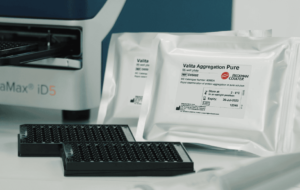Beckman Coulter unveils rapid protein aggregation assay
Beckman Coulter Life Sciences has launched a new high-throughput assay that promises to drastically cut the time required to detect and quantify protein aggregation during monoclonal antibody development.

Beckman Coulter Valita Aggregation Pure assay
The Valita Aggregation Pure assay is a 96-well plate-based screening tool that can provide robust antibody aggregation data in just 15 minutes. This represents a drastic speedup compared to traditional techniques like dynamic light scattering (DLS), static light scattering (SLS), and HPLC size-exclusion chromatography (SEC) which can take up to 6 hours.
“Generating a viable commercial cell line requires processing thousands of samples, which is a complex and tedious workflow,” said Dr Elisa Nent, Global Product Manager for Cell Health at Beckman Coulter. “There is a critical need for methods to rapidly measure antibody aggregation much faster than the traditional approaches.”
New fluorescence polarization assay
The new fluorescence polarization assay streamlines the workflow by enabling quantification of antibody aggregates at any stage simply by adding purified samples to the plate and incubating briefly at room temperature before reading in a capable microplate reader. No additional reagents or manual steps are required.
Validated for antibody samples from 200-2000 mg/L with a detection limit of 0.5% aggregation at 1000 mg/L, the Valita Pure assay enables high-throughput screening with results in minutes rather than hours. This can allow antibody developers to accelerate their process development workflow and focus efforts on critical research goals.
The assay is compatible with standard microplate readers with fluorescence polarization detection capabilities. It continues Beckman Coulter’s mission to reduce time-consuming manual processes through laboratory automation and innovation.
- To learn more, visit: Valita Aggregation Pure Assay




